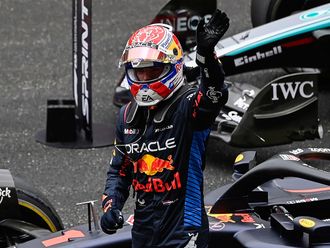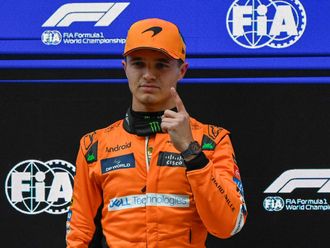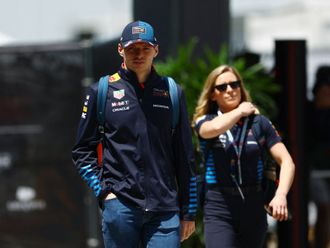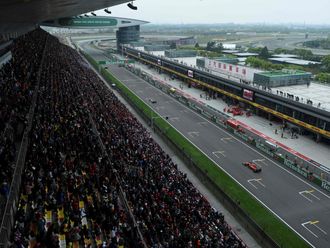Dubai: Formula One truly is ‘a man’s world’, as the song goes, traditionally the sole domain of testosterone-fuelled petrol heads bidding to prove their masculinity by being faster than their rivals.
Indeed, the ultimate example of sporting machismo has never been, in the immortal words of soul singer James Brown, ‘nothing without a woman or a girl’ — apart from in the pit-lane dollies and leggy lovelies cooing over their driver boyfriends.
Hoping to buck such a deeply entrenched, male-dominated tradition is Susie Wolff, a British development driver with Williams — “basically I carry out aerodynamical tests at the start of the year, with a lot of work in a simulator testing the new development parts”.
The Scot is bidding to become only the third woman, and the first Briton, to take part in a Formula One World Championship grand prix.
Since first getting into karting at the age of eight – she was named as the top driver in the world in this discipline in 2000 – Wolff has risen through the motorsport ranks, taking part in Formula Renault and Formula Three.
In 2006, Wolff made the big step up to compete in the Deutsche Tourenwagen Meisterschaf (DTM), the German Touring Car series, one of the biggest championships of its kind in the world.
Now the 30-year-old wants to break new ground by moving into the rarefied realms of Formula One, having joined Williams last year.
But threatening to put the brakes on her dream is not only the fact that she has to contend with scepticism about her credentials from many male counterparts in the sport, but also the fact that F1 is renowned as a highly competitive and cut-throat environment.
The roguish supremo of the sport, Bernie Ecclestone, perhaps did not help matters when, on commenting on Wolff’s arrival at Williams last year, he remarked: “If Susie’s as quick in a car as she looks good out of a car, she’ll be a huge asset [to the sport].”
The blonde-haired Wolff is undoubtedly attractive, but is no brainless bimbo, as Ecclestone also noted by praising her for being “intelligent”.
The straight-talking, feisty Scot certainly appears to possess the requisite mix of streetwise savvy and steely determination to ensure she will not cowed by any criticism or cynicism from her male peers.
She insists that, while she respects the top drivers in the world and followed closely the fortunes of fellow Scot David Coulthard, who retired several years ago, she does not fawn over world champion Sebastian Vettel and co.
There’s also a hint of impressive insouciance in her voice when she reveals: “I know a lot of them very well. I’ve known Lewis [Hamilton] since I first started racing, I wouldn’t say I socialise a lot with him, not at all.”
It’s also clear she’s mildly exasperated and weary about her sex being brought up in relation to her involvement in motorsport.
Asked whether she is passionate about proving that women can thrive in a man’s world, she declared emphatically: “No, not at all. I am not passionate about being the first British woman to start a race in Formula One. I am passionate about the being the best racing driver I can be.”
Earlier this year, a BBC television documentary about Wolff carried the grandiose title of: ‘Driven: The Fastest Woman in the World.’
Does Wolff think she is indeed the quickest female on the planet and does she also feel as if she has strive to live up such a lofty and potentially pressure-laden billing?
She said: “That name is no problem to me. I am not one to turn round to the BBC and say they shouldn’t call the documentary that; it was their choice to call it that. Whether I am or not [the fastest in the world], it’s not really a title I’m interested in.”
Wolff, who refused to name names of people in the sport who have treated her with disdain, added of the problems she has faced: “I think throughout my career there have always been moments when it’s been quite tough [to be a woman in motorsport]. Many people want to see a woman in Formula One, many people don’t think it can happen. Many people are for it and many people are against it. I have my critics and I have my supporters. When people try and generalise by saying women can’t compete at the level of Formula One, that annoys me. But ultimately, I am there because I want to be a successful racing driver. I try and ignore the comments and do the best job possible.”
Other detractors have mischievously suggested that the fact that Wolff’s husband Toto, the head of motorsport for Mercedes F1, is a Williams shareholder is a key reason for her presence in the team.
Unsurprisingly, Wolff is irked considerably by such an assertion — perhaps even more than when her gender is being used as a stick with which to beat her.
She said: “Do people think he was in the car changing gear for me driving around Silverstone [for the Young Driver Test in July for up-and-coming drivers]? It’s such an old story now, I get asked about it so much. Carlos Sainz Junior testing for Red Bull: Did people question that his father [former world rally champion Carlos Senior] helped get him a test? Nico Prost: did anyone mention that his four-time world championship-winning father Alain get him a test [for Lotus Renault]? No. But people love to drag up the fact that my husband owns shares in the Williams team. As much as he’s a massive support to me and I am very grateful to him, he’s not the one that puts me in the car as I am the one out there.”
While Wolff appears well capable of taking the barbs from misogynistic males and naysayers in her stride, it remains to be seen whether she succeed under the crushing weight of history.
The Italian driver Maria Teresa De Filippis, who made three starts for Maserati and Behra-Porsche, was the first flag-bearer for the women’s motorsport movement when she became the first female to take part in a grand prix in 1958, in Belgium.
But only one other woman has competed in a grand prix since, De Filippis’ compatriot Lella Lombardi, who achieved the distinction of scoring the first points by a woman (0.5) at the 1975 Spanish Grand Prix.
However, Wolff has not been ploughing a lone female furrow in her groundbreaking attempt in the modern day.
The Spaniard Maria de Villota joined the Marussia team as a test driver last year, but her attempts to break new ground for women were cruelly derailed by a life-threatening testing accident last July.
De Villota lost her right eye as a result, has not ruled out a return to F1 despite her injuries.
As such, for now Wolff is shouldering the burden of being the only female driver in the sport, although she stresses she has no particular future goal in mind other than taking part in a grand prix.
She said: “When I first joined Williams last year, I told people I wasn’t going to run before I walked. There were a series of steps I needed to take, including the Young Driver Test. I showed I could do 89 laps around Silverstone, which is a super-fast track (on the final day she finished ninth, 2.2 seconds behind three-time and current world champion Vettel). I think that was a step in the right direction, but Formula One is very fast moving. The car had an incredible amount of downforce – the harder you push, the faster you go. It was great fun to drive. Certainly at the end of the day I just thought I had to get back in this car because it was so much fun to drive. You never know what’s around the corner, so for me it’s a case of continuing on my path, keep working hard and keep hoping an opportunity [in the sport] will arise.”
Of the hardest thing about adapting to the rigours of F1, Wolff said the exacting fitness levels required were a “big challenge” for her.
But after her Silverstone experience, she insists questions about physical capabilities have been “put to rest a bit”.
“I raced at a top level of racing in DTM for seven years. You have to be ready for the challenge or not put yourself forward for it,” she said. “I don’t think what I will do if my Formula One dream doesn’t happen. I’m still part of the Williams team. There are many other opportunities aside from Formula One on the table. I will see what opportunity is best and then during the winter decide which to take.”
Single-minded Susie may never make it to the starting grid in F1, but her brave ‘woman’s heart’ is a welcome addition to this most masculine of environments.












